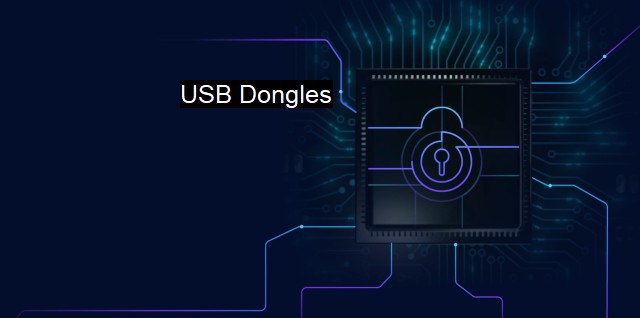What are USB Dongles?
Exploring USB Dongles: The Ultimate Cybersecurity and Antivirus Solution for Better Data Protection
USB Dongles refer to a small device that plugs into a computer or a laptop’s Universal Serial Bus (USB) port. This device serves various purposes depending on its functions and features, whether enabling Wi-Fi connectivity, Bluetooth convenience, or software protection. Recently USB dongles have taken on a new role in the realm of cybersecurity and antivirus protection.In the cybersecurity context, a USB dongle is employed as a device for authentication. It functions to ensure a high level of protection against unauthorized access to sensitive data. This is achieved through digital certification or public-key infrastructure (PKI). In other words, a USB dongle operates as a physical key to your online recourses that accessible only upon plug-in, thus providing not a simple password, but so-called two-factor or even multi-factor authentication.
Remembering complicated passwords can prove to be a difficult task, considering the many accounts and professional documents required in today's tech oriented life. The requirement amplifies under circumstances where passwords need updating every few months. This resulted in a practice where many tend to use more and more compromised or weak passwords, hence underlining the relevance of using a USB dongle as a sound alternative.
These dongles will typically contain a concealed private cryptographic key. When you log into your crypto-protected service, instead of a password, you will insert your dongle and then your remote service will commence an encrypted challenge with it. It then instructs the dongle to decrypt that challenge using its concealed private key for proving your identity confirmation. This not only eradicates the need for complex password memories, but the also removes the threats associated with typing password every time.
In simpler terms, as long as you have possession of your USB dongle, you are able to control access to your documents, emails, cloud archives, corporate portals, and virtually anything else that comes under the realm of digital resources that require extensive security.
When it comes to the antivirus usage, USB dongles do deliver value. Cybersecurity companies are now introducing USB security dongles that also provide onboard antivirus security. This particular type of USB dongle comes equipped with in-built virus protection software that's ready to protect a system as soon as it is plugged in. This antivirus software contained in the USB dongle is commanded to enforce an automatic scanning procedure that checks every document being opened, file being copied, or executable being run.
For instances, antivirus dongles can also serve with an application control feature so that installing any suspicious application on the system can be blocked until any verification has successfully cleared them. In relation to prevention, specific USB dongles can also provide vaccination to the system against harmful AutoRun based malware.
Having emphasized USB dongles’ utility, some notes are worthwhile to mention. It’s recognized among cybersecurity professionals that losing the dongle leads to losing access to digital resources until a reasonably costly replacement arrives, or in worst-case scenarios, it may fall into the wrong hands leading to disastrous consequences. Further, while convenient, USB dongles cannot overcome security vulnerabilities rooted within the system. Thus, they should not be totally relied upon as standalone devices for system security; in fact, they best serve as part of an overall security strategy.
The use of USB dongles in the context of cybersecurity and antivirus protection has ushered a significant contribution to both convenience and system safety. As this technology continues to evolve, we can only expect it to become even better and more indispensable. Nonetheless, understanding their utility and limits could better serve individuals and organizations in managing their cybersecurity posture in highly digitalized spaces.

USB Dongles FAQs
What is a USB dongle?
A USB dongle is a small, portable device that is used to connect to a computer, providing additional functionality or security. In the context of cybersecurity and antivirus, USB dongles can be used to authenticate users or provide secure access to software.How can USB dongles help with cybersecurity?
USB dongles can help with cybersecurity by serving as a physical key or token that users must have in order to access sensitive information or software. This adds an extra layer of security beyond traditional username and password authentication.What should I look for when choosing a USB dongle for antivirus protection?
When choosing a USB dongle for antivirus protection, look for one that supports the specific antivirus software you are using. Additionally, make sure the dongle is compatible with your computer's operating system and has a high level of encryption to prevent hacking or unauthorized access.Are there any drawbacks to using a USB dongle for cybersecurity?
One potential drawback of using a USB dongle for cybersecurity is that it can be lost or stolen, which could compromise sensitive information or software. Additionally, if the dongle is damaged or malfunctions, it could prevent access to important data. However, these risks can be mitigated with proper precautions, such as keeping a backup of the data and using tracking technology to locate lost or stolen dongles.| | A | | | B | | | C | | | D | | | E | | | F | | | G | | | H | | | I | | | J | | | K | | | L | | | M | |
| | N | | | O | | | P | | | Q | | | R | | | S | | | T | | | U | | | V | | | W | | | X | | | Y | | | Z | |
| | 1 | | | 2 | | | 3 | | | 4 | | | 7 | | | 8 | | |||||||